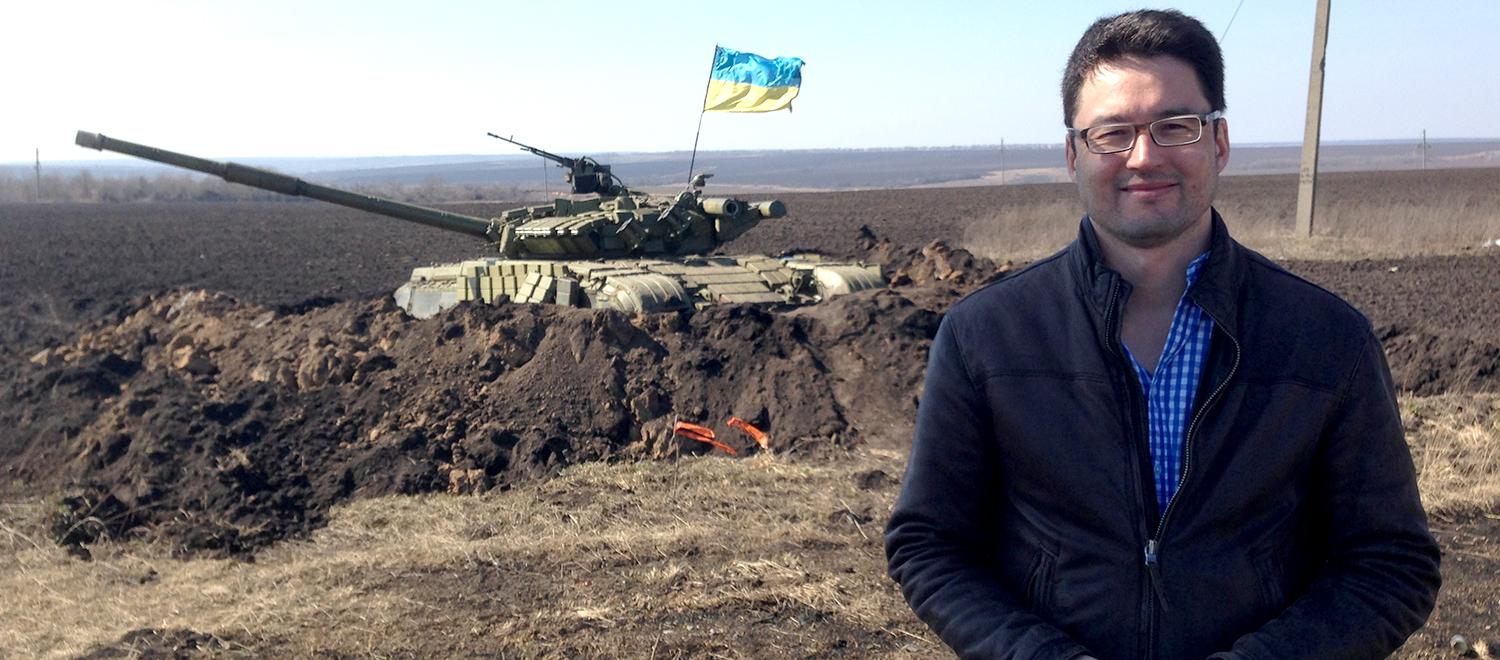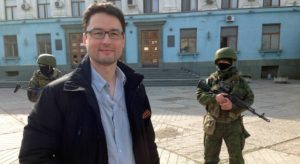
Lucian Kim ’92 calls himself a wanderer.
The summer before his first semester at Clark University, he backpacked his way around Eastern Europe. He did it again two summers later — then spent his junior year studying abroad in Germany. He made his first trip to Russia that year as well.
All that roaming has served Kim well. Currently National Public Radio’s Moscow correspondent, he has covered Russia, Ukraine, and Germany for media outlets including Bloomberg News, Reuters, Slate, Newsweek and The Christian Science Monitor.
Special projects have taken him to Kosovo, Afghanistan and North Korea. “It’s not a coincidence that I ended up in journalism,” he says. “One of the job requirements is wandering.”
♦♦♦♦
Kim enrolled at Clark at the urging of his father, Ha Poong Kim ’58 (an uncle, Sang Kyong Kim, M.A. ’59, and cousin, Stefan Deuchler, are also alumni).
“According to family legend,” Kim says, “my dad and his future brother-in-law were in South Korea after the Korean War. The entire country had been devastated, and, of course, this was pre-Internet — what did people in war-torn South Korea know about the U.S.? Somehow, my uncle had a brochure from Clark. They both said, ‘Well, this looks very nice,’ and applied. That’s how it happened back then; they didn’t have access to Barron’s or U.S. News.”
Kim didn’t set out to be a journalist. “My path into the profession was an evolution. Russian studies, environmental issues — that was much more my focus at Clark.”
What about ‘the Russia question’? Read more >>
At Clark, Kim majored in geography and foreign languages.His mother was a native of Switzerland, so he grew up speaking German. He took advanced courses in German, as well as French and Spanish, but was keen to learn Russian.
His fascination with Russia was sparked within the pages of a boyhood gift from his parents: a 700-page book of Russian fairy tales. “The fact that the Soviet Union was closed, far away, and America’s mortal enemy, added to the country’s mystique,” he wrote in his blog. “I devoured every book on Russia I could get my hands on.”
Today, Kim recalls the popularity of Russian 101 classes in his first year at Clark. “This was 1988, the time when there were monumental changes happening in the Soviet Union, and people were interested.” In his senior year, Kim took advanced Russian language classes at Holy Cross (he’d also studied the language at the University of Trier in Germany during his junior year abroad).
A seminar on Mikhail Gorbachev, taught by Professor Zenovia Sochor, inspired him to focus his attention on political and social upheaval in Eastern Europe.
“It was just after the Berlin Wall came down, which was intimately connected to so many changes going on in the Soviet Union. We were watching history and trying to analyze it as it was happening,” Kim recalls. “It was a current affairs course about a country most of us hadn’t been to.”
Sochor has since passed away. “I feel some regret that I was unable to let her know what an influence she had on me,” he says.
Kim’s ability to observe and assess arose from a rare source: a course called “The New England Landscape,” taught by Professor Martyn Bowden. The class included field trips to study architecture and search for historical clues in the countryside, sometimes just by exploring stone walls.
“He taught me to look at the world,” he says. “That skill became very important to me as a journalist. I think a lot of what you learn in college becomes subconscious. You might not remember the details of the material, but you’re equipped with certain observational, analytical skills. That’s what I’ve got: the ability to observe, to see things that aren’t necessarily obvious.
“News is only interesting once it’s embedded in a larger context,” he continues. “As a correspondent reporting on Russia, what I try to do with my stories is show how singular events fit in the Russian context, the Russian reality, and Russian history.”
♦♦♦♦

Kim started his journalism career in Berlin in 1996, as a correspondent for The Christian Science Monitor, covering Germany, Eastern Europe, and Central Asia. One assignment took him to pre-9/11 Afghanistan. There, he endured a harrowing helicopter ride to the mountain stronghold of Ahmad Shah Massoud, where he interviewed the legendary Mujahedeen commander who helped drive out the invading Soviet Red Army in the 1980s and was leading the last resistance to the Taliban militia.
In 2002, Kim traveled to his father’s birthplace, located in what is now North Korea. “Like a visiting dignitary, I toured the country in a chauffeur-driven car,” he recalls on his website. “Sumptuous feasts were prepared for me in empty hotels. Human contact was restricted to my two government minders.” Chillingly, he adds, “North Korea is hard to take seriously because its rulers resemble cartoon villains. But they have come closest to creating an Orwellian hell-on-earth.”
Moscow beckoned, and in 2003 Kim became the business editor and a columnist for The Moscow Times. He changed outlets in 2006, covering Russian energy giant Gazprom, as well as Vladimir Putin’s government and the Russia-Georgia War, for Bloomberg News. He later returned to Berlin and used the city as a home base while covering Russia, Germany and Ukraine for various outlets. He also blogged about his travels to Sochi (as “Russia’s only subtropical city” prepared to host the 2014 Winter Olympics) and Chechnya, and covered the Moscow “protest movement.”
Kim joined NPR in 2016 and returned to Moscow, where he covers all things Russia, as well as the former Soviet states. Last October, he reported on the Russian “troll factory,” an office complex in St. Petersburg where hundreds of employees spend their days flooding social media with disinformation and fake news.
♦♦♦♦
“News is only interesting once it’s embedded in a larger context.”
Kim has never remained static, always hungry for a new experience. His backpacking trek across East Germany, Poland, Czechoslovakia and Hungary in the summer of 1988 was a particular eye-opener. “I was accepted everywhere I went, with open arms — people were very curious about Americans.”
It helped that his parents had accepted his travel. “There was no use in trying to stop me,” he laughs. His only means of communicating with home were rare phone calls and a few postcards.
While today’s students might find the lack of instant communication a mind-blowing proposition, “we didn’t even know about the possibility,” Kim says. “So there was nothing scary about it.”
At the beginning of his senior year on the Clark campus, all students received email addresses for the first time, but the only way to send and receive messages was from certain terminals in the library. “I remember the first emails I sent were from Goddard Library terminals to friends I had in Russia. That was the best way of staying in touch. Phone calls were exorbitantly expensive, and letters took forever, or never arrived — to get a response could take a month and a half, or even two months. Email was revolutionary.”
♦♦♦♦
Lucian Kim frequently is heard reporting from Moscow on NPR News, delivering the Russian angle to the day’s news (see related story). “I often file stories very early in the morning, Eastern time. They have to fill the newscast, every 20 minutes, with news bulletins; editors are always pretty panicked about filling that space.”
During his time at Clark, Kim didn’t write for The Scarlet or any alternative student publications. “I didn’t know I was going to be a journalist,” he says. “But I would recommend that any student interested in pursuing this career write for The Scarlet or another publication because you’ll be confronted on a micro level with all the problems and issues professional journalists face. No matter what level you’re at, you’ll have the same kind of ethical issues.”
The journalism industry has changed in many ways, Kim explains, as has the number of ways to enter it. “The nice thing now is that you can start your own blog. If you’re writing about things that are relevant to your community, people will read it.”
As an American correspondent in Moscow, Kim knows he’s in a much safer position than his Russian colleagues. “Journalists who are doing investigative work for Russian media outlets or uncovering stories the government would prefer to keep covered — these people can face real physical danger. Even reporters of local issues can be targets.
“Foreign correspondents for international media aren’t as vulnerable,” he says. “Your organization is elsewhere, and the Russian government almost expects you to write negative things. They’re more concerned with whatever Russian journalists write, for a Russian audience, in their native language. That news is accessible to a wide audience, especially on the internet, so it might threaten someone’s interests.”
Kim insists he feels “very comfortable” in Russia.
“I’ve taken great pains to learn the Russian language and to understand the people and where they’re coming from, so I feel very safe. I have a lot of Russian friends.”
Spoken like a seasoned wanderer.
At top: Lucian Kim on assignment in eastern Ukraine, near the Russian border, March 2014. (All photos courtesy Lucian Kim.)
This story was published in the winter 2018 issue of Clark magazine.


